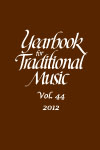
YEARBOOK FOR TRADITIONAL MUSIC
Scope & Guideline
Preserving the Voice of Traditional Music
Introduction
Aims and Scopes
- Ethnomusicological Research:
The journal is dedicated to ethnomusicological studies that examine the music of different cultures through comprehensive fieldwork and analysis, emphasizing the importance of context and cultural significance. - Interdisciplinary Approaches:
It encourages interdisciplinary methodologies, integrating perspectives from anthropology, sociology, and cultural studies to enrich the understanding of music traditions and their societal roles. - Global Perspectives on Traditional Music:
The journal showcases a diverse range of musical traditions from around the world, focusing on both well-documented and underrepresented musical forms, thus promoting a global dialogue about musical heritage. - Cultural Preservation and Revitalization:
A significant emphasis is placed on the role of music in cultural identity, preservation, and revitalization efforts, particularly among indigenous and marginalized communities. - Innovative Performance Practices:
The Yearbook also explores contemporary performance practices and innovations within traditional music genres, reflecting on how they adapt and evolve in modern contexts.
Trending and Emerging
- Musical Activism and Social Justice:
There is a growing focus on how traditional music acts as a form of activism and a medium for social justice, reflecting current global movements and the role of music in political discourse. - Community and Identity:
Research increasingly emphasizes the relationship between music, community engagement, and identity formation, particularly in the context of diaspora and migration. - Ecological and Environmental Concerns:
Emerging themes explore the intersection of traditional music with ecological issues, highlighting how music can respond to and reflect environmental changes and challenges. - Digital Ethnomusicology:
The rise of digital platforms and online dissemination of music has led to new research on how these technologies impact traditional music practices and cultural transmission. - Transnational Musical Practices:
There is a noticeable trend towards examining transnational influences and hybrid musical forms that emerge from the interactions between different cultures.
Declining or Waning
- Historical Musicology:
There has been a noticeable decrease in papers focused solely on historical musicological analysis, as contemporary ethnomusicological approaches that emphasize present-day practices and meanings take precedence. - Western Classical Music Traditions:
Research centered on Western classical music traditions has diminished, as the journal increasingly prioritizes non-Western music traditions and the contexts surrounding them. - Music Theory and Analysis:
Papers that primarily engage in theoretical and analytical frameworks of music without an ethnographic or cultural lens are becoming less frequent, indicating a shift towards more applied and context-driven studies. - Commercial Music Studies:
There is a waning interest in traditional music's intersection with commercial music industries, as the journal focuses more on grassroots and community-based music practices. - Music and Technology:
Although technology's role in music is still relevant, specific discussions around technology's impact on traditional music practices have seen a decline, as the journal shifts towards more ethnographic and experiential narratives.
Similar Journals

Musicologist
Championing Excellence in Musicological StudiesMusicologist is a premier academic journal dedicated to the exploration and analysis of music theory, history, and practice, published by the esteemed Trabzon University State Conservatory in Turkey. With an ISSN of 2618-5652, this journal has been a vital platform for scholars since its inception in 2019, reflecting a commitment to fostering innovative research in the field of music. Recognized for its quality, the journal currently holds a Q2 ranking in the music category for 2023, placing it within the top segments of its discipline, as evidenced by its position at #72 out of 180 in the Scopus rankings, representing the 60th percentile. Although the journal employs a traditional publication model, it serves as a crucial repository for contemporary musicological discourse, aiming to advance knowledge and understanding within a vibrant academic community. Musicologist is not only a resource for seasoned researchers but also an invaluable tool for students and professionals alike, nurturing a comprehensive appreciation of music as an art form and scholarly pursuit.
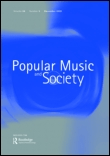
POPULAR MUSIC AND SOCIETY
Charting the Influence of Popular Music on SocietyPOPULAR MUSIC AND SOCIETY, published by Taylor & Francis Ltd, is a leading interdisciplinary journal that explores the intricate relationships between popular music and social dynamics. With an ISSN of 0300-7766 and E-ISSN 1740-1712, this esteemed journal has established a significant presence in the academic community since its inception, covering a broad scope from 1971 and continuing to provide critical insights into contemporary issues in popular music research. Currently classified as Q1 in both Cultural Studies and Music for 2023, it ranks impressively within the top quartile of its fields, showcasing its scholarly impact and relevance. With a Scopus ranking of #42 in Music and #305 in Cultural Studies, POPULAR MUSIC AND SOCIETY serves as an essential platform for researchers, educators, and students to engage with innovative theories and analyses that reflect the evolving cultural landscape. The journal does not currently offer Open Access options, ensuring a focused readership that values in-depth scholarly work. Nestled in the United Kingdom, this publication continues to shape discussions around music's role in society, making it a pivotal resource for those dedicated to understanding the cultural significance of popular music.

INTERNATIONAL REVIEW OF THE AESTHETICS AND SOCIOLOGY OF MUSIC
Exploring the Cultural Resonance of MusicThe INTERNATIONAL REVIEW OF THE AESTHETICS AND SOCIOLOGY OF MUSIC, published by the Croatian Musicological Society, is a pivotal scholarly journal dedicated to the intricate intersection of music, aesthetics, and sociology. With a special focus on exploring the cultural and social dimensions of music, this journal serves as a platform for researchers, professionals, and students alike to disseminate innovative ideas and transformative research. Although it operates under a traditional access model, the journal's impact within the field of music studies is underscored by its commendable Scopus ranking in the Q3 category and its established history from 2009 to 2016, with a renewed focus from 2018 to 2023. With an ISSN of 0351-5796, it continues to shape academic discourse with its insightful contributions and is essential for those aiming to engage deeply with the evolving dynamics of music in society.
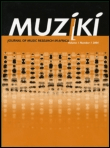
Muziki-Journal of Music Research in Africa
Connecting Cultures Through the Study of MusicMuziki - Journal of Music Research in Africa is a leading publication dedicated to exploring the rich tapestry of music research across the African continent. Published by Routledge Journals, Taylor & Francis Ltd, this journal has been at the forefront of scholarly discourse since its inception in 2004, providing a platform for innovative and interdisciplinary approaches to the study of music. With an ISSN of 1812-5980 and E-ISSN of 1753-593X, it ensures wide accessibility to both print and digital audiences. As of 2023, it holds a prestigious Q3 ranking in the field of Music, reflecting its commitment to quality scholarship and the promotion of diverse musical narratives. Muziki is particularly invaluable for researchers, professionals, and students seeking to deepen their understanding of African musicology and its socio-cultural relevance. The journal publishes original research articles, reviews, and critical essays, highlighting contemporary developments and historical contexts in music research. With a Scopus rank of 59/180 in the Arts and Humanities Music category, it stands as a respected source for advancing knowledge and fostering dialogue within the global music community.
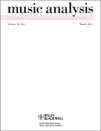
MUSIC ANALYSIS
Illuminating the Intersection of Music and CultureMUSIC ANALYSIS, published by WILEY, is a prestigious journal in the field of musicology, recognized for its critical contributions to the analysis of music and its myriad influences on culture and society. With an ISSN of 0262-5245 and an E-ISSN of 1468-2249, this journal has established itself as a vital resource for researchers, professionals, and students alike, boasting a Q1 ranking in the 2023 category of Music. As part of a highly competitive field, it ranks 70th out of 180 in the Arts and Humanities Music category on Scopus, positioning it within the 61st percentile. MUSIC ANALYSIS serves as an essential platform for innovative research and insightful discourse, engaging with musical theory, practice, and education from 1996 to 2024. Its commitment to fostering rigorous scholarship makes it indispensable for those seeking to deepen their understanding of music and its analytical frameworks. Although it does not offer Open Access options, its relevance and impact in the genre ensure accessibility through institutional subscriptions and university libraries.

Musicology Today
Shaping the Future of Musicology TogetherMusicology Today, published by SCIENDO, is a pivotal journal in the field of musicology, presenting a platform for scholars, researchers, and practitioners to disseminate their findings and engage with current trends in music research. With its ISSN 1734-1663 and E-ISSN 2353-5733, the journal aims to provide a comprehensive overview of various aspects of music, including theory, history, and ethnomusicology, fostering a multidisciplinary dialogue among its contributors. Located in Warsaw, Mazovia, Poland, this journal is not only committed to high academic standards but also to promoting open access to knowledge, thereby enhancing accessibility for a global audience. As it continues to bolster its reputation in the academic community, Musicology Today plays an essential role in shaping the future of music scholarship and invites the engagement of seasoned researchers and emerging voices alike.
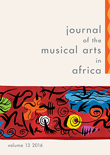
Journal of the Musical Arts in Africa
Connecting Cultures Through the Power of MusicThe Journal of the Musical Arts in Africa is a premier academic publication dedicated to exploring the rich and diverse musical traditions of the African continent. Published by ROUTLEDGE JOURNALS, TAYLOR & FRANCIS LTD, this journal offers a vital platform for researchers, professionals, and students in the field of musicology. With an ISSN of 1812-1004 and E-ISSN of 2070-626X, the journal has established itself as a significant contributor to the scholarly discourse surrounding African musical practices. With an impact factor reflecting its growing influence, the Journal of the Musical Arts in Africa is categorized in the Q3 quartile of music journals according to the latest metrics, placing it among an essential cadre of publications in the field. The journal invites original research articles, reviews, and critical essays that aim to expand the understanding of music as an integral part of African culture. It has been continuously publishing since 2004 and encompasses a wide range of topics, making it a must-read for anyone interested in the intersections of music, culture, and identity on the African continent. The journal stands as a testament to the vibrant musical heritage of Africa and encourages scholarly contributions that highlight the importance of music in reflecting and shaping societal values.
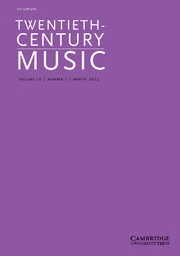
Twentieth-Century Music
Pioneering Research on a Century of Musical Diversity.Twentieth-Century Music is a premier academic journal dedicated to the study and critique of music composed in the twentieth century. Published by CAMBRIDGE UNIVERSITY PRESS, this journal holds an esteemed position in the music discipline, reflecting its significance with a Q1 ranking in the Music category as of 2023. Covering a wide timeline from its convergence years (2004 to 2010, 2012 to 2024), it serves as a vital platform for scholars, practitioners, and students to explore innovative research, critical analyses, and interdisciplinary approaches to music of this dynamic era. With an ISSN of 1478-5722 and E-ISSN 1478-5730, the journal is committed to maintaining high scholarly standards and includes open access options to enhance visibility and accessibility of research findings. As part of the robust arts and humanities community, which ranks it at 62 out of 180 in Scopus, Twentieth-Century Music is essential reading for anyone looking to deepen their understanding of contemporary musical trends and their historical contexts.
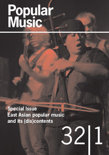
Popular Music
Exploring the Soundtrack of SocietyPopular Music, published by Cambridge University Press, is a leading academic journal that has been at the forefront of contemporary music studies since its inception in 1981. With its comprehensive scope encompassing a rich diversity of topics within the fields of Cultural Studies and Music, this journal holds a respectable Q2 ranking in both categories as of 2023, underscoring its significant impact on the scholarly discourse surrounding popular music. Researchers, professionals, and students alike will find invaluable insights within its pages as it explores the socio-cultural dynamics of music from various global perspectives. While it is not an open-access journal, the publication aims to foster critical dialogue and interdisciplinary scholarship. Based in the United Kingdom, Popular Music serves as a vital resource for those interested in the intersections of music, culture, and society, sustaining a vibrant academic community through rigorous peer-reviewed articles and reviews. Engage with the latest research and deepen your understanding of popular music's ever-evolving landscape.

Musicologica Brunensia
Unveiling Musical Insights for AllMusicologica Brunensia, an esteemed journal published by Masaryk University, Faculty of Arts, serves as a significant platform for the dissemination of knowledge in the field of musicology. Based in the Czech Republic, this Open Access journal has been facilitating scholarly communication since 2009, allowing unrestricted access to its rich array of research articles. With an ISSN of 1212-0391 and an E-ISSN of 2336-436X, Musicologica Brunensia proudly holds a Q3 ranking in the Music category as of 2023, reflecting its dedication to advancing research in the arts and humanities, particularly music. The journal accepts contributions spanning diverse topics within music studies, fostering interdisciplinary dialogue among researchers, professionals, and students alike. Located at Arne Novaka 1, Brno, 60200, Czech Republic, Musicologica Brunensia is poised to continue its journey of promoting innovative scholarship in musicology until 2024 and beyond, making it a valuable resource for anyone passionate about the field.